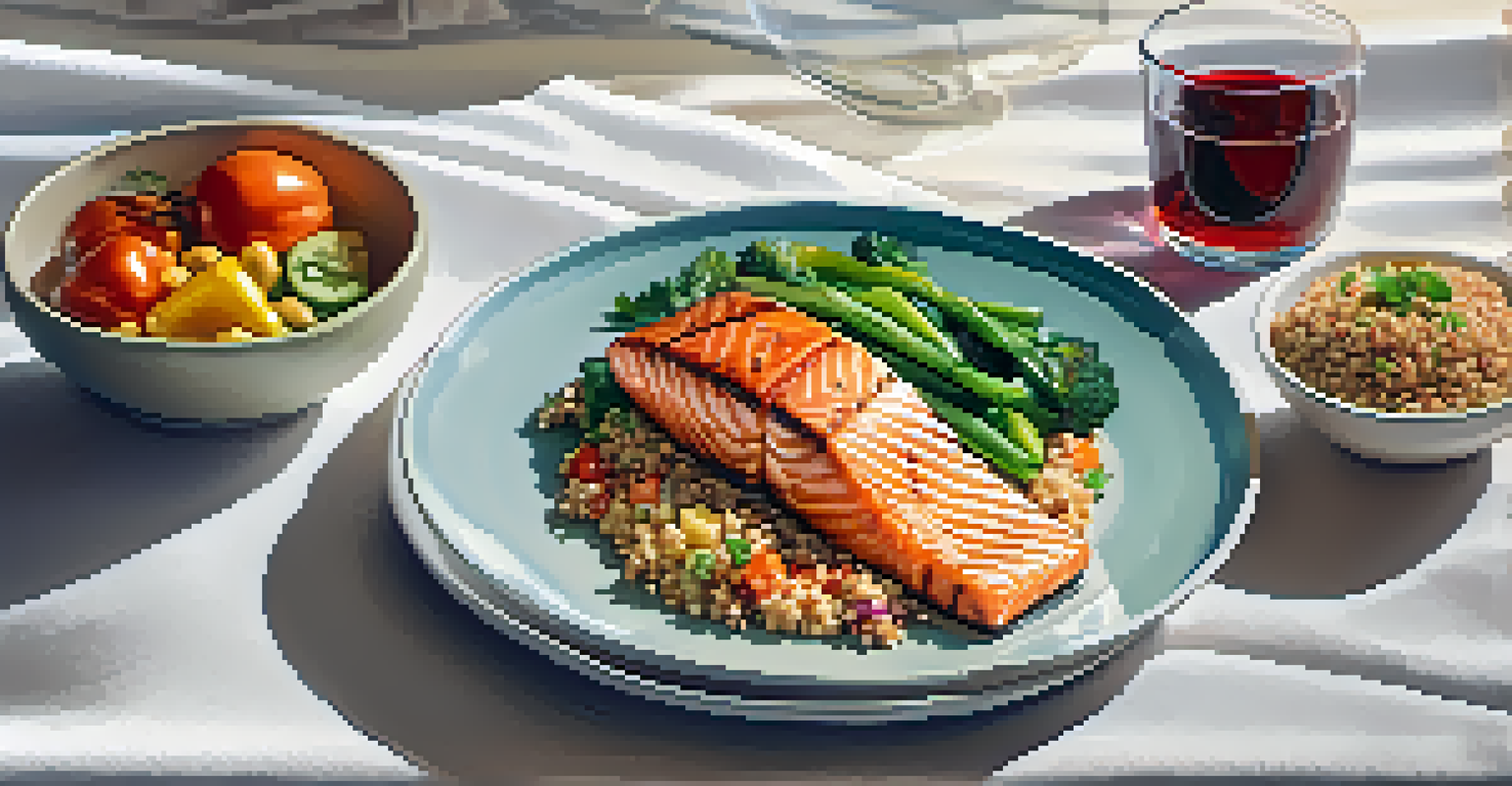Foods for Gut Health: Nourishing Your Microbiome

Understanding the Importance of Gut Health
Gut health is pivotal to overall well-being, affecting everything from digestion to mood. A thriving gut microbiome, which comprises trillions of bacteria, helps break down food, absorb nutrients, and regulate your immune system. When your gut is in balance, you often feel better both physically and mentally.
All disease begins in the gut.
Conversely, an unhealthy gut can lead to issues like bloating, constipation, and even anxiety. Many factors can disrupt this balance, including diet, stress, and antibiotic use. Thus, focusing on gut health can be a game changer for many aspects of your life.
Understanding how to nourish your gut can lead to improved health outcomes. By incorporating specific foods into your diet, you can help maintain and restore your microbiome to its optimal state.
Fiber-Rich Foods: The Gut’s Best Friends
Fiber is essential for gut health, acting as a fuel source for good bacteria. Foods high in fiber, such as fruits, vegetables, and whole grains, help to promote regular bowel movements and prevent constipation. When you consume fiber, it ferments in the gut, producing short-chain fatty acids that reduce inflammation and enhance gut health.

For example, foods like lentils, chickpeas, and oats are excellent sources of soluble fiber. They not only help your digestion but also support the growth of beneficial gut bacteria. If you're looking to boost your fiber intake, consider adding a serving of beans or a piece of fruit to your meals.
Gut Health Affects Overall Well-Being
A balanced gut microbiome is crucial for digestion, nutrient absorption, and mental health.
Incorporating a variety of fiber-rich foods can lead to a diverse gut microbiome, which is linked to better health. The more diverse your diet, the more types of bacteria thrive in your gut, ensuring optimal digestion and nutrient absorption.
Fermented Foods: Nature’s Probiotics
Fermented foods are brimming with probiotics, which are live bacteria that promote gut health. These foods, such as yogurt, kefir, sauerkraut, and kimchi, can help restore balance to your gut microbiome. When consumed, probiotics can aid digestion and enhance your immune system.
Let food be thy medicine and medicine be thy food.
For instance, yogurt is not only delicious but also contains strains like Lactobacillus that can help maintain a healthy gut. Including fermented foods in your daily diet can be as simple as adding a scoop of yogurt to your breakfast or enjoying a side of kimchi with your dinner.
By incorporating a variety of fermented foods into your meals, you can easily boost your probiotic intake. This can lead to improved gut flora, which may help reduce digestive issues and promote overall wellness.
Prebiotics: Feeding Your Good Bacteria
While probiotics are the good bacteria, prebiotics are the food that these bacteria thrive on. Found in foods like garlic, onions, and bananas, prebiotics are types of fiber that nourish your gut microbiome. By consuming prebiotic-rich foods, you create an environment where beneficial bacteria can flourish.
For example, adding a clove of garlic to your cooking not only enhances flavor but also boosts your gut health. Similarly, bananas are a great snack that can provide the necessary nutrients for your gut bacteria to thrive.
Fiber and Fermented Foods Matter
Incorporating fiber-rich and fermented foods into your diet supports beneficial gut bacteria and enhances gut health.
Incorporating prebiotics into your diet is simple and delicious. A balanced diet rich in both prebiotics and probiotics can lead to a happy and healthy gut, enhancing your overall well-being.
Omega-3 Fatty Acids: The Anti-Inflammatory Powerhouse
Omega-3 fatty acids are essential fats that play a crucial role in reducing inflammation throughout the body, including the gut. Foods like fatty fish, walnuts, and flaxseeds are rich in omega-3s and can help support gut health. By reducing inflammation, omega-3s can help alleviate symptoms related to gut issues.
For instance, incorporating salmon or sardines into your meals not only provides delicious flavor but also delivers a powerful dose of omega-3s. These fatty acids can encourage the growth of beneficial gut bacteria, promoting a healthy microbiome.
Including omega-3-rich foods in your diet can be an easy and beneficial way to support your gut health. Whether it’s enjoying a fish dinner or sprinkling flaxseeds on your smoothie, these healthy fats can be a delicious addition to your meals.
Hydration: The Unsung Hero of Gut Health
Hydration is often overlooked when discussing gut health, but it's incredibly important. Drinking enough water aids digestion and helps to dissolve nutrients, making them more accessible to your body. Moreover, adequate hydration can prevent constipation and support the mucosal lining of the intestines.
For example, starting your day with a glass of water can kickstart your digestive system. Additionally, herbal teas and broths can provide hydration while also offering soothing benefits for your gut.
Hydration Supports Gut Function
Staying hydrated is essential for digestion and helps maintain the mucosal lining of the intestines.
Making hydration a priority can enhance your gut health significantly. Simple changes, such as carrying a water bottle or incorporating hydrating foods like cucumbers and watermelon into your diet, can make a big difference.
The Role of a Balanced Diet in Gut Health
Ultimately, a balanced diet is key to maintaining a healthy gut microbiome. Eating a variety of foods ensures that you get a wide range of nutrients, which supports diverse gut bacteria. Focusing on whole, minimally processed foods can provide the nutrients your gut needs to thrive.
For instance, aim to fill your plate with colorful vegetables, lean proteins, and healthy fats. This variety not only nourishes your body but also feeds your gut bacteria, leading to a more resilient microbiome.

By embracing a balanced diet, you create a sustainable approach to gut health. It’s less about strict diets and more about nourishing your body with the foods it craves and needs for optimal health.